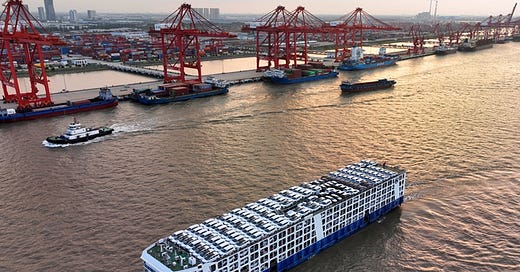Tech Insider: China’s Auto Exports Belie Roadblocks, SOE Carmaker Picks Huawei
Early Chinese EV entrant Singulato goes bust, Nvidia sounds fresh warning about U.S. export restrictions
A shipment of cars is exported overseas from Taicang port in Jiangsu province on Aug. 9. Photo: VCG
Auto export surge belies roadblocks abroad
Riding the wave of an electric-vehicle (EV) frenzy and the global shift toward electrification, Chinese automakers have performed well in their push to go global.
In the first six months of 2023, Chinese auto exports ballooned 75.7% year-on-year to 2.14 million vehicles, extending strong growth seen in the first quarter, according to industry data. The rosy figures have fueled a belief that China will claim the top spot for the full calendar year, with some analysts predicting that Chinese automakers will ship more than 4 million vehicles in 2023.
However, the road ahead is not without hurdles, especially from some governments in Europe and the U.S., which are ramping up policies to promote their own EV industries.
State-owned auto giant picks Huawei’s smart driving tech
State-owned automaker Chongqing Changan Automobile Co. Ltd. has picked Huawei Technologies Co. Ltd. as a supplier of driver-assistance systems for one of its electric-vehicle (EV) lines, a source told Caixin, as the U.S.-sanctioned giant accelerates the commercialization of its smart driving technology.
Changan’s Deepal brand will equip its EVs with Huawei’s Advanced Driving System, the source said, without providing details.
Huawei and Deepal both did not respond to Caixin’s requests for comment.
Huawei began its push into the auto industry in 2019 as a supplier of automated driving technology as it tried to offset the impact of U.S. sanctions on its consumer electronics business.
Early Chinese EV entrant Singulato goes bust
Singulato Motors, one of China’s earliest new-energy vehicle startups, entered bankruptcy liquidation after allegedly raising around $2.3 billion in funding without delivering any vehicles.
Several entities related to Singulato started the winding-down process in late June, according to a national bankruptcy cases portal. Its parent company faced debt claims totaling 98.3 million yuan ($13.5 million) as of Aug. 20.
Established in 2014, Singulato was among China’s electric-car pioneers along with Nio Inc. The company announced eight rounds of fundraising over several years totaling 17 billion yuan. But it received only 5 billion yuan in actual funding, sources told Caixin.
Several company employees told Caixin that not all the proceeds were used for carmaking, blaming management’s inadequate investment for the failure.
Nvidia sounds fresh warning about U.S. export restrictions to China
Nvidia Corp. acknowledged that the U.S. may impose stronger restrictions on the sale of chips to China and warned that such a move will hurt American companies in the long term, reiterating a broadly held view among top chipmakers.
Nvidia Chief Financial Officer Colette Kress, speaking with analysts late Wednesday, argued that existing curbs on the sale of AI chips and high-end components were already having the desired effect.
“Over the long term, restrictions prohibiting the sale of our data center GPUs to China, if implemented, will result in a permanent loss of an opportunity for the U.S. industry to compete and lead in one of the world’s largest markets,” Kress said.
Baidu revenue outperforms
Baidu Inc.’s revenue rose the most in more than a year, and the company joined China’s largest internet companies in resuming growth after Beijing relaxed its grip on the private sector to jumpstart a faltering economy.
The company reported a larger-than-projected 15% jump in sales to 34.1 billion yuan ($4.7 billion) for the June quarter. Net income rose 43% to 5.2 billion yuan.
Like Alibaba Group Holding Ltd. and Tencent Holdings Ltd., Baidu is riding a recovery in advertising and consumer spending from the pandemic in 2022, despite increasing turbulence in the world’s No. 2 economy.
Meituan reports fastest growth since 2021
Meituan posted its fastest revenue expansion since 2021 after dining and travel bounced back from pandemic depths, yet executives warned that economic uncertainty should begin to eat into growth this quarter.
Sales rose a better-than-projected 33% to 67.96 billion yuan ($9.3 billion) in the quarter ended in June. Meituan swung to an operating profit of 4.7 billion yuan from a small loss a year earlier, helped by a doubling in gross transactions volume across its in-store, hotel and travel business.
As with its rivals in the internet industry, Meituan is seen as a barometer of China’s post-Covid recovery, which has proven broadly weaker than expected. But Meituan benefited this year as consumers grappling with a property slump shun big-ticket items to spend on experiences from trips and movies to dining.




